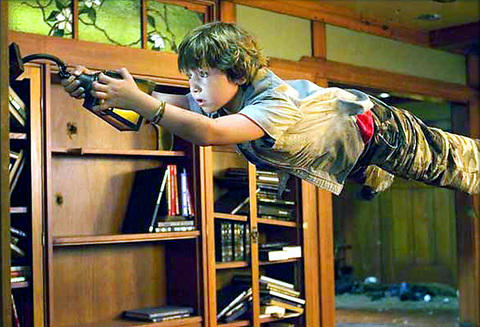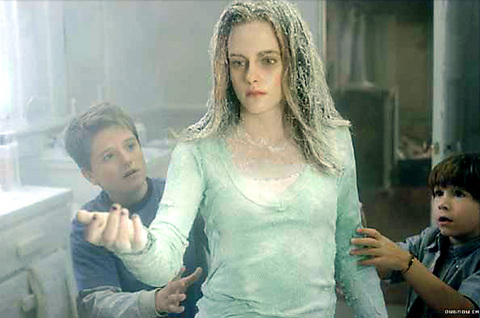Did board-game sales plummet after the terrors of Jumanji?
It's hard to imagine any kid rolling the dice for Monopoly after the unrelenting brutality of marauding elephants and screeching monkeys in Chris Van Allsburg's chilling tale.
But one of the rules of Hollywood is that movie kids never learn from watching other movies. So 10 years after Jumanji, a new duo of bickering siblings discovers a dusty old board game called Zathura, and the resulting destruction makes Doom look like Candyland.

Children seem to love the concept, at least the half-dozen I took with me to help calibrate my cynic-meter. Ranging from 10 to 13, the junior previewers each found something to love in Zathura: A Space Adventure, and demanded a glowing review.
Glowing may be a bit much from a parent feeling assaulted by meteor showers and mindless Zorgons. But I'd have to agree that Zathura is a rousing tale with an agreeable balance of fear and teachable moments, the kind of adventure story that seems old-fashioned these days.
Van Allsburg is an expert at spooking kids to the verge of downright meanness. The robo-elves of The Polar Express turned the North Pole into a Stepford factory town. Jumanji made you wonder how often the beloved author was left alone in childhood to unhappy ends.

Zathura pulls back a bit from that precipice. Two brothers bicker relentlessly as their dad (Tim Robbins) tries to work at home on a quiet Saturday afternoon. The boys hate their creaky old house -- though parents will salivate over the triple-wide, Craftsman-style bungalow that co-stars.
Danny and Walter hate their parents' divorce, and they seem to hate each other. In a nice touch, no one even acknowledges the presence of a self-absorbed 15-year-old sister, until she's awakened at 2pm for emergency service.
Younger brother Danny (Jonah Bobo) finds a forgotten board game called Zathura and starts to play the space adventure.
Disdainful older brother Walter (Josh Hutcherson) grows interested when the house is suddenly pelted by burning meteors and floats into outer space.
Like Jumanji, the problem with Zathura is that danger piles upon danger without progression, logic or point. The kids have no control over their destiny, merely waiting in horror for the next assault.
Zathura softens the approach with a slacker astronaut portrayed nicely by Dax Shepard. He has been stuck in the game for a while, and knows to finish his salami sandwich before getting overheated about the latest Zorgon attack.
Some of the set pieces stretch on far too long, with each conclusion telegraphed well in advance. Zathura is painfully stretched, and should have come in at a speedier 80 minutes.
But screenwriter David Koepp hits realistic notes and positions the family for comeuppance.
"All I know," Danny trembles, "is when we play this game, bad things happen."
True, except for a movie that your kids will probably appreciate.

On April 26, The Lancet published a letter from two doctors at Taichung-based China Medical University Hospital (CMUH) warning that “Taiwan’s Health Care System is on the Brink of Collapse.” The authors said that “Years of policy inaction and mismanagement of resources have led to the National Health Insurance system operating under unsustainable conditions.” The pushback was immediate. Errors in the paper were quickly identified and publicized, to discredit the authors (the hospital apologized). CNA reported that CMUH said the letter described Taiwan in 2021 as having 62 nurses per 10,000 people, when the correct number was 78 nurses per 10,000

As we live longer, our risk of cognitive impairment is increasing. How can we delay the onset of symptoms? Do we have to give up every indulgence or can small changes make a difference? We asked neurologists for tips on how to keep our brains healthy for life. TAKE CARE OF YOUR HEALTH “All of the sensible things that apply to bodily health apply to brain health,” says Suzanne O’Sullivan, a consultant in neurology at the National Hospital for Neurology and Neurosurgery in London, and the author of The Age of Diagnosis. “When you’re 20, you can get away with absolute

May 5 to May 11 What started out as friction between Taiwanese students at Taichung First High School and a Japanese head cook escalated dramatically over the first two weeks of May 1927. It began on April 30 when the cook’s wife knew that lotus starch used in that night’s dinner had rat feces in it, but failed to inform staff until the meal was already prepared. The students believed that her silence was intentional, and filed a complaint. The school’s Japanese administrators sided with the cook’s family, dismissing the students as troublemakers and clamping down on their freedoms — with

As Donald Trump’s executive order in March led to the shuttering of Voice of America (VOA) — the global broadcaster whose roots date back to the fight against Nazi propaganda — he quickly attracted support from figures not used to aligning themselves with any US administration. Trump had ordered the US Agency for Global Media, the federal agency that funds VOA and other groups promoting independent journalism overseas, to be “eliminated to the maximum extent consistent with applicable law.” The decision suddenly halted programming in 49 languages to more than 425 million people. In Moscow, Margarita Simonyan, the hardline editor-in-chief of the